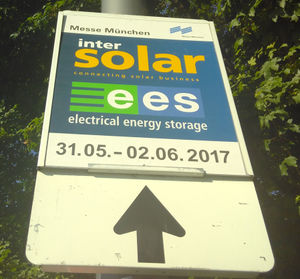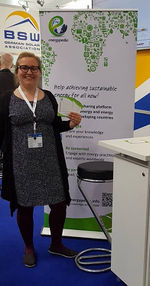Off-grid Power Conference at the Intersolar 2017
Energypedia was visible at the booth of BSW/GIZ/BMZ at the Intersolar 2017, in June in Munich. We had our roll-up with and had a number of interesting talks with potential and frequent authors! Thank you for visiting our stand and we are looking forward to the next year!
Many relevant off-grid power actors were among the over 800 exhibitors. Unfortunately, they were scattered in the 5 halls (A1-A3, B1-B2) throughout the fair. Next year, the plan is to keep the off-grid sector together in one place to even simplify the connection and cooperation possibilities among all stakeholders. Nonetheless, many interesting conversations were possible. Partly due to the meeting point at the Off-Grid Power Conference 2017 also hosted on 31st May and 1st June 2017 in Munich during the Intersolar trade fair 2017.
Off-grid Power Conference at the Intersolar 2017
The German Solar Association (BSW-Solar) and its partners Alliance for Rural Electrification (ARE) and Intersolar Europe invited to the event supported by the German Federal Ministry for Economic Cooperation and Development (BMZ). It took place during the fair in Hall B1 room B11 and B12.
The conference was an opportunity for manufacturers, system integrators and project developers to meet high-ranking delegations, policy makers, investors and the international press by taking part in the Off-Grid Power Conference.
During six sessions, participants had the chance to discuss with the presenters on topics like mini-grids, investment and financing opportunities, off-grid solutions for humanitarian settings, and for agricultural purposes.
All speakers’ presentations of this year's Off-Grid Power Conference can be downloaded from the homepage of BSW (PDF-Documents).[1]
Opening Session
After the introduction by Jörg Mayer, Managing Director, German Solar Association (BSW-Solar) & Ernesto Macias, President, Alliance for Rural Electrification (ARE), Jens Burgtorf welcomed the participants in the name of BMZ. Afterwards, Dana Rysankova, Senior Energy Specialist, Energy Sector Management Assistance Program (ESMAP), World Bank, gave the key note speech.
Jörg Meyer mentioned the PV milestone that one third of all globally new installed power was PV. He also referred to the BSW matchmaking platform that facilitates business contacts and deals between German solar companies involved in export and investors from around the world. At its core the platform functions as a matchmaking tool, which through targeted and freely combinable queries brings together suppliers of solar products (photovoltaics, solar thermal, electrical and thermal storage systems) and services with potential customers. The registration and use of the platform is free of charge for member companies and companies of selected partner organizations.
Ernesto Macias, ARE President was pleased with the special attention that has been given to off-grid in the Intersolar 2017, one of the largest PV trade fairs around the world. Furthermore, he mentioned the lack of coordination of initiatives as one of the challenges in the sector. However, the conference proved once again the interest in the sector and that he expects lots of discussions and experiences from practitioners from around the world. Addressing the rural electrification with smaller system is much more complicated than installing large projects. All sessions will give answers to the question “how to promote decentralised energy technologies!” He suspects that the problem is not the money, nor the technology but rather the politicians.
Jens Burgtorf explained that “decentralising is the first step” and that the BMZ has a focus on Africa whose countries could learn from the fact that the German “Energiewende” also started with people investing in solar power! National regulations and incentives made it possible that the general population could take place in a transition towards renewable energies.
Dana Rysankova presentation included facts about two major shifts:
- The WB focuses shifts towards off-grid: half of the total portfolio of energy in 2017 was addressing off-grid, while in 2010 it was only a quarter!
- And also, national Governments tend to shift their focus. E.g. Rwanda focuses now on off-grid solutions in rural areas!
Session 1 – Off-Grid Hybrid PV
Oliver Drücke, Solar23 GmbH
- Many SME could profit from energy efficiency analysis: how to save energy (=money). Even in the short term, many advantages are expected. Nonetheless, many SME are hesitant to implement such analysis: they have no possibility to assess and gauge the technologies and they fear to enter a long term contract loosing on flexibility.
- Solar becomes competitive below the threshold of 20€/kWh. And payback time of solar solutions are often between 3-5 years. However, Diesel is often subsidised.
- Lessons learnt: Nonetheless, they identify rural electrification and large consumers in remote areas (with an expensive Diesel back up) as the largest demand for solar PV hybrid systems. The largest market share is 300 kW – 1 MW.
Karsten Schulte, Kraftwerk Renewable Power Solutions
- Off-grid projects need much more time to materialise (on-grid projects usually are implemented within a year).
- Lessons learnt: Silence is a big selling point! Especially for luxury hotels. They can offer silence during the day with a solar PV plant and with an optimised load management also during most of the night.
- Example: Hotel in Chile in the Atacama desert.
Dr. Karl Kolmsee, Smart Hydroower GmbH
- Load management is driving costs of rural electrification projects!
- If you have a use for the left over energy (water pumping, ice making, dryers/coolers and many other productive use cases of electricity), deferrable load can be used to stabilize the load.
- Lessons learnt: Always go hybrid!!
- Lessons learnt: Ask the communities what type of productive use they need!
- If they buy more appliances that cannot be covered year-around with the electricity provided, mini-grids are not successful! (Large TV sets in mini-grids with hydropower are demanding to much electricity during dry season)
- If they participate in the process of identifying suitable productive use cases, especially **They train locals during 1-2 weeks and check after 6 weeks whether or not 1-2 community members have taken the responsibility for the mini-grid.
Session 2 – Mini-Grids, Micro-Grids & Storage
Pablo Munoz, Studer Innotec SA
- Lessons learnt: Engage communities into the work! (E.g. digging tranches for the cables)
- The design of the solar product follows the electricity flow.
- Lessons learnt: The load could be diversified by offering a bonus mode during the day with a full battery and a restriction of demand in case of an empty battery: some of the consumption was shifted to the afternoon!
Amalia Suryani, Energising Development, Indonesia
- The investment of 2% of total construction costs of the mini-grids into Quality Inspections was successful: there was a slight improvement of the compliance and the performance components!
- They hope that the Government implements standardised installation quality control in all of the 500 mini-grids on the many islands of Indonesia, as they build approx. 100 per year.
Session 3 – Off-Grid Solutions for Industries, Telecommunications and Infrastructure
Session 4 – Investing in Off-Grid Solar
Session 5 – Off-Grid Solar PV for Humanitarian Actions
Virgina Taborda, SOLARKIOSK AG
- Lessons learnt: not only provide the energy, but also what to do with it! An end-to-end solution for retail and their customers. Retailers run the 200 solar kiosk as a profitable business. Customers use the energy provided. E.g. schools get solar PV panels but also an innovation lab, projectors, tablets, light for longer hours to teach; better teachings, e.g. picture board education for traumatised people). 2kW E-hub with satellite, WIFI, tablets charging station.
Inga Buchholz, Energising Development
- Opportunities: public funding of infrastructure is restoring the trust in the Government!
- Infrastructure like energy access is valuable for the host communities and the refugees. Make sure to address all relevant stakeholders!
- Challenges: In the camp, there are usually no partner organisations, EnDev can work with. Long term planning is difficult as displaced persons are seen as “guests” and are expected to leave “soon”. Investors are hard to find, as the war destroys the implemented infrastructure and in addition, they are used to the free aid.
- Comment from the audience: the first step of the energy ladder is the biggest!
Svet Bajlekov, E.ON Off-grid Solutions GmbH
REN 21 GSR Report Sneak Preview
Session 4 – Off-Grid Energy for Agriculture
Further information
- Off-Grid Power Conference can be downloaded from the homepage of BSW
- REN21: The GSR 2017 report
- Mini-grid portal
References
- ↑ The German Solar Association BSW-Solar (2017): Off-Grid Power Conference https://www.solarwirtschaft.de/index.php?id=796.





















